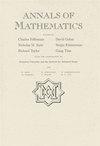Rigid local systems and the multiplicative eigenvalue problem
IF 5.7
1区 数学
Q1 MATHEMATICS
引用次数: 6
Abstract
We give a construction which produces irreducible complex rigid local systems on $\Bbb{P}_{\Bbb{C}}^1-\{p_1,\dots,p_s\}$ via quantum Schubert calculus and strange duality. These local systems are unitary and arise from a study of vertices in the polytopes controlling the multiplicative eigenvalue problem for the special unitary groups $\operatorname{SU}(n)$ (i.e., determination of the possible eigenvalues of a product of unitary matrices given the eigenvalues of the matrices). Roughly speaking, we show that the strange duals of the simplest vertices of these polytopes give (all) possible unitary irreducible rigid local systems. As a consequence we obtain that the ranks of unitary irreducible rigid local systems (including those with finite global monodromy) on $\Bbb{P}^1-S$ are bounded above if we fix the cardinality of the set $S=\{p_1,\dots,p_s\}$ and require that the local monodromies have orders which divide $n$, for a fixed $n$. Answering a question of N. Katz, we show that there are no irreducible rigid local systems of rank greater than one, with finite global monodromy, all of whose local monodromies have orders dividing $n$, when $n$ is a prime number. We also show that all unitary irreducible rigid local systems on $\Bbb{P}^1_{\Bbb{C}} -S$ with finite local monodromies arise as solutions to the Knizhnik-Zamalodchikov equations on conformal blocks for the special linear group. Along the way, generalising previous works of the author and J. Kiers, we give an inductive mechanism for determining all vertices in the multiplicative eigenvalue problem for $\operatorname{SU}(n)$.刚性局部系统与乘性特征值问题
我们给出了$\Bbb上产生不可约复刚性局部系统的一个构造{P}_{\bb{C}}^1-\{p_1,\dots,p_s\}$通过量子舒伯特演算和奇异对偶。这些局部系统是酉的,源于对控制特殊酉群$\operatorname{SU}(n)$的乘性特征值问题的多面体中的顶点的研究(即,在给定矩阵特征值的情况下,确定酉矩阵乘积的可能特征值)。粗略地说,我们证明了这些多面体的最简单顶点的奇异对偶给出了(所有)可能的酉不可约刚性局部系统。因此,我们得到了$\Bbb{P}^1-S$上的酉不可约刚性局部系统(包括具有有限全局单调系统的系统)的秩是有界的,如果我们固定集合$S=\{p1,\dots,P_S\}$的基数,并要求局部单调系统对于固定的$n$具有划分$n$的阶。在回答N.Katz的一个问题时,我们证明了不存在秩大于1的不可约刚性局部系统,具有有限的全局单调性,当$N$是素数时,其所有局部单调性都具有除$N$的阶。我们还证明了具有有限局部半群的$\bb{P}^1_{\bb{C}}-S$上的所有酉不可约刚性局部系统都是作为特殊线性群保角块上的Knizhnik-Zamalodchikov方程的解而产生的。在此过程中,推广了作者和J.Kiers以前的工作,我们给出了一个确定$\算子名{SU}(n)$乘性特征值问题中所有顶点的归纳机制。
本文章由计算机程序翻译,如有差异,请以英文原文为准。
求助全文
约1分钟内获得全文
求助全文
来源期刊

Annals of Mathematics
数学-数学
CiteScore
9.10
自引率
2.00%
发文量
29
审稿时长
12 months
期刊介绍:
The Annals of Mathematics is published bimonthly by the Department of Mathematics at Princeton University with the cooperation of the Institute for Advanced Study. Founded in 1884 by Ormond Stone of the University of Virginia, the journal was transferred in 1899 to Harvard University, and in 1911 to Princeton University. Since 1933, the Annals has been edited jointly by Princeton University and the Institute for Advanced Study.
 求助内容:
求助内容: 应助结果提醒方式:
应助结果提醒方式:


